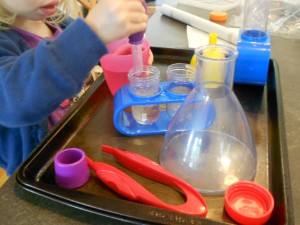How much science do you think children need to know before kindergarten? And why would it be important before starting school? Those are great questions, and if they answers aren’t exact, it makes for an interesting discussion.
 While early childhood programs are not the same in different areas, we usually assume that kids have some basic, general science knowledge, such as birds fly and fish swim. Kids know that night is dark, with only a moon, and daytime is bright with a sun. Trees have leaves and plants can’t move like people and animals. Most kids know the name of obvious parts of the body and can answer questions about 5 senses, like what do ears do, what do we use to smell, etc.
While early childhood programs are not the same in different areas, we usually assume that kids have some basic, general science knowledge, such as birds fly and fish swim. Kids know that night is dark, with only a moon, and daytime is bright with a sun. Trees have leaves and plants can’t move like people and animals. Most kids know the name of obvious parts of the body and can answer questions about 5 senses, like what do ears do, what do we use to smell, etc.
These are things that kids just seem to know. If they don’t know, we wonder if it’s because of a lack of experience or a possible indication of a learning challenge. Normally, kids are curious and eager to learn as much as they can.
Where do kids learn about basic science? Well, considering kids ask over 300 questions a day, many answers come from parents. They also learn by play and from ordinary experiences. As they seasons change, there is plenty for kids to be curious about. Why are the leaves falling and changing color? Why is it colder and they have to wear a coat? Why is it so warm and they have to wear a hat?
Kids are also curious about their own body and what bodies can and can’t do. It’s not enough for parents and caregivers to tell them, they have to try for themselves. And ask more questions, even if they don’t like the answers. Children also have unique interests, perhaps about dinosaurs, airplanes, magnets, or rocks, for example.
Children’s experiences and play build a base for more learning at school, but it starts with what kids do at home. Play isn’t rocket science, but that is where it begins. What kind of science play does your child enjoy?
